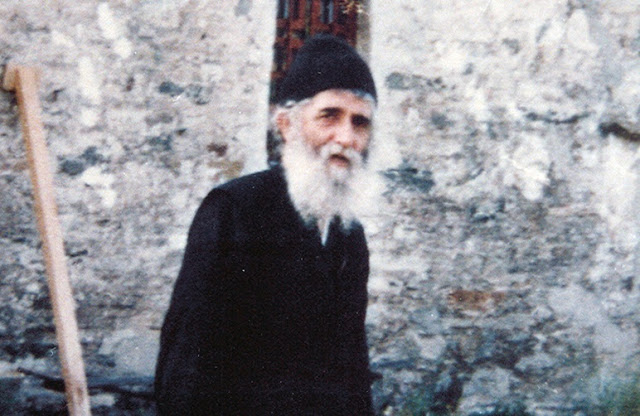Excerpts from Sermons: "How Can We Forsake Ourselves?"
Holy
Fathers used to say, "Silence is a gladsome light wandering the path of
transformation." (Sermon after the All-Night Vigil on August
19, 2017)
By Fr. Andrew Malakhovsky
The Lord tells us that we must walk circumspectly, for the
days are evil. It appears to us that we have a long way to go. We think that we
will have an opportunity to do something tomorrow, be patient tomorrow, pray
more tomorrow but that "tomorrow" may never come, and the Lord will
judge us as we are. This is why we ought to pay more attention to our lives and
always do what God wants us to do. May the Lord help us to be spiritually rich
and to treat everything that happens in our lives with patience and gratitude. (Sermon
after the Divine Liturgy in the Boarding Home on August 18, 2017)
How can
we follow Christ? How can we forsake ourselves? Replying to his disciples'
question, "Who, then, can be saved?" the Lord declares, "With
men this is impossible; but with God all things are possible." Of course,
we will hardly be able to get saved using only our own power. Nevertheless, God
is powerful enough to correct us. He affirms that He came to save the sinners
who are aware of the fact that they do not deserve his Kingdom. It is
demonstrated with the example of a thief who indeed was the worst man; he had
killed, robbed, and raped many people but he saw God just before his death and
realised how bad he was. Seeing that he did not deserve the Kingdom, he simply
asked Jesus, "Remember me, O Lord, in Thy Kingdom." He humbled down,
acknowledged that he was a sinner, and became a saint all at once. Perhaps, we
also realise sometimes that we are far from being worthy, that the gates are
locked, that we cannot enter the Lord's Kingdom due to our sins, due to our
spritual condition, and these are the very moments when we actually do have the
chance to get there because we humble ourselves down and recognise who we are
before God. It is easy to compare yourself to an alcoholic neighbour, to a
debauchee, to an unbeliever but as soon as you juxtapose yourself with God, you
will see how much He loves you. (Sermon after the Divine Liturgy on August 27,
2017)
You can
teach your child to go to church regularly, to take communion and confess, and
probably even fulfil the commandments and to abstain from something. How can
you teach him love? How can you teach him the Sacrament that is the
relationship with God? It is one's wholehearted participation in the Holy
Eucharist, where Christ enters not only one's mouth but also goes all the way down
to one's heart and rules there that really matters, not the formal ritual and
religious obligations. Regardless of all our sinfulness, what is important is
that we abide in that Kingdom and do our best to keep it in our hearts. How we
manage to do it is a different question. Do we really try? Do we have the
desire to follow Christ? If we do, the Lord will give us this opportunity. Our
task is to thank God for his gifts. (Sermon after the Divine Liturgy in the
Boarding Home for Children with Special Needs on August 26, 2017)
By Fr. Sergius Nezhbort
The
sorrows, afflictions, and hardships of our lives force us down to earth. Our
spiritual short-sightedness makes us depressed. We must remember, though, that
no matter how hard it is, the Lord is always near. [...]
We often
have near-death experiences in the course of our lives. Yes, we say something
during that time, we go somewhere and try doing something, but our souls are
dying so it is hard to tell whether you are dead or alive. We must remember
that the victory over death has already happened, and it must happen in our
lives, too. (Sermon after the Divine Liturgy on August 28,
2017)
Saint
Mark the Apostle and Evangelist writes about the healings that the Lord was
doing. He gave physical health back to people who had been suffering from
various ailments. We all know that our plans, dreams, and intentions are prone
to destruction if we lack physical health. However, the Gospel tells us about
those healings because they foreshadow the final healing. The healing that
every one of us gets from Christ is the restoration of the integrity of our
being and renewal of normal relationships with God and our neighbours that the
Risen Lord grants us. Each one of us should try to make this Lord's gift work
in his own life. (Sermon after the Divine Liturgy on August 24,
2017)
May the
Lord help everyone to understand that we all do something for God's sake so as
to reach the condition which will make it a little bit easier for God to save
us. (Sermon
after the Divine Liturgy on September 11, 2017)
By Fr. Rodion Alkhovik
We see in
some saints real-life examples of people who had fallen very low but the Lord
still restored them, which means that He is capable of bringing us back to our
feet, too, if we repent, go to church, and try to change our lives. (Sermon
after the All-Night Vigil on September 9, 2017)
November 21, 2017
St.
Elisabeth Convent

































































